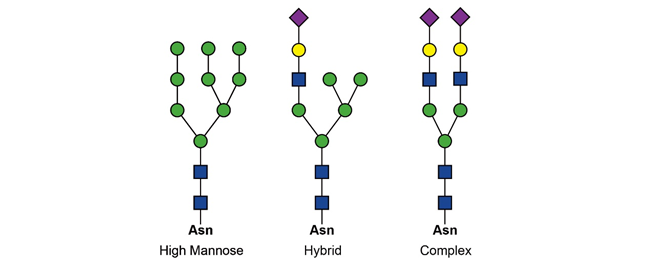AntibodySystem는 Primary Antibody Biosimilar - Research Grade
제품을 전문적으로 생산하는 20년의 경험이 있는 High Quality 제조사입니다.
Glycosylation is a common post-translational modification in eukaryotic cells that plays a crucial role in protein folding, stability, activity, and intercellular signaling. Protein glycosylation can be primarily categorized into two types: N-linked glycosylation and O-linked glycosylation. The oligosaccharide chains in N-linked glycosylation can be further divided into three types: high-mannose, complex, and hybrid types.

Fig. 1 Three main types of glycans
Despite its importance, glycosylation can also present certain challenges: (1) it reduces protein homogeneity, which can hinder protein crystallization; (2) abnormal glycosylation can lead to the onset of various diseases. Deglycosylation enzymes are valuable tools for studying glycoproteins and diseases associated with abnormal glycosylation.
Among the glycosidases with specific activities, PNGase F is a broad-spectrum N-linked glycosidase with no specificity for amino acid sequences. It efficiently cleaves all three types of N-linked glycans: high-mannose, hybrid, and complex types. Because PNGase F does not depend on specific protein conformations, it can cleave glycans from denatured proteins. Moreover, its efficiency in cleaving glycans from denatured proteins is generally higher than that for native, active proteins.

Fig. 2 The types of glycans recognized by PNGase F and its cleavage site
Endo S is an endoglycosidase that specifically recognizes and cleaves the complex glycans at the Asn297 site of human IgG.

Fig. 3 The types of glycans recognized by Endo S and its cleavage site
CU43, another glycosidase, also specifically targets the Asn297 site of human IgG, efficiently cleaving both hybrid and complex glycans. Studies have shown that, in mouse models, CU43 effectively prevents autoimmune hemolytic anemia and antibody-dependent enhancement (ADE) effects (Diego et al., Cell, 2024), demonstrating good in vivo activity.

Fig. 4 The types of glycans recognized by CU43 and its cleavage site
Endo S2 is capable of cleaving all three types of glycans-high-mannose, hybrid, and complex-at the Asn297 site of human IgG.

Fig. 5 The types of glycans recognized by Endo S2 and its cleavage site
It is important to note that the deglycosylation activities of Endo S, CU43, and Endo S2 are highly dependent on the intact conformation of human IgG. If human IgG is denatured, these enzymes cannot cleave the glycans. Furthermore, Endo S, CU43, and Endo S2 are unable to remove glycans from human IgA, IgM, IgE, or IgGs from other species.
The following is a summary of the four enzymes:
Enzyme | Catalog No. | Target Glycan Types | Recognition Site | Dependence on Protein Conformation | Scope of Action | Additional Features |
PNGase F | YXX04901 | High-mannose, hybrid, complex | None | Not dependent on protein conformation | Works on both denatured and native proteins | Broad-spectrum; highly efficient in cleaving glycans from denatured proteins |
Endo S | YXX05201 | Complex glycans | Human IgG Asn297 | Highly dependent on protein conformation | Specific to human IgG | High specificity; targets complex glycans only |
CU43 | YXX25001, EXX25001 | Hybrid, complex glycans | Human IgG Asn297 | Highly dependent on protein conformation | Specific to human IgG | Good in vivo activity; prevents autoimmune hemolytic anemia and ADE effects |
Endo S2 | YXX06601 | High-mannose, hybrid, complex | Human IgG Asn297 | Highly dependent on protein conformation | Specific to human IgG | Capable of cleaving all three glycan types |
Reference
Sastre, D.E., Bournazos, S., Du, J., Boder, E.J., Edgar, J.E., Azzam, T., Sultana, N., Huliciak, M., Flowers, M., Yoza, L., et al. (2024). Potent efficacy of an IgG-specific endoglycosidase against IgG-mediated pathologies. Cell 187, 6994-7007.e6912.
AntibodySystem의 모든 제품들을 만나 보세요!
Antibodysystem - Official Distributor in South Korea "Morebio" 한국 독점 대리점 "모아바이오"